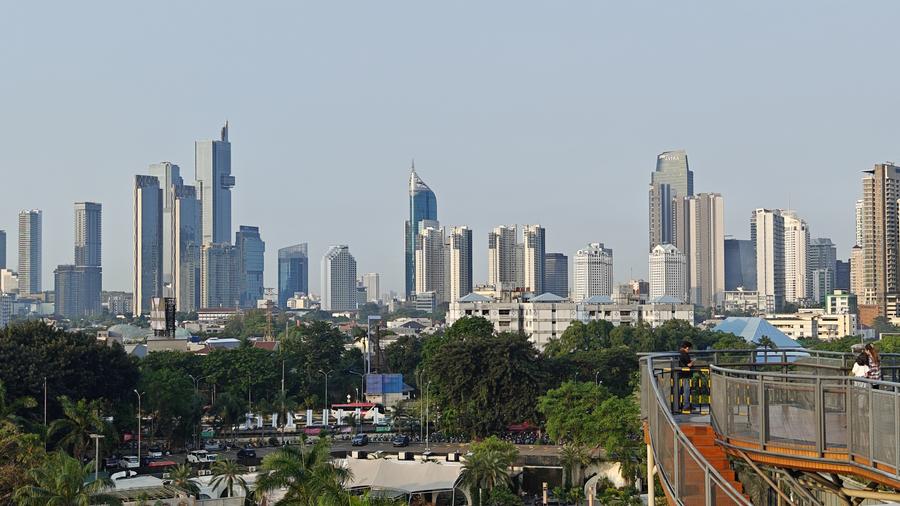
Indonesia’s BRICS membership is expected to boost growth in Southeast Asia’s biggest economy, enabling the country to serve as a role model for other ASEAN members keen on joining a growing bloc that focuses on the Global South, analysts said.
The Indonesian Ministry of Foreign Affairs said joining BRICS is an achievement that reflects the country’s increasingly active role in global issues, as well as its commitment to strengthening multilateral cooperation to realize a more inclusive and equitable global order.
Mustafa Izzuddin, senior international affairs analyst at Solaris Strategies Singapore, said Indonesia’s membership of BRICS is “congruent with its aspiration to be a middle power by playing the role of a good international citizen”.
READ MORE: China congratulates Indonesia on becoming full member of BRICS
Established in 2009, BRICS is the acronym for the five emerging economies of Brazil, Russia, India, China, and South Africa.
BRICS decided to expand its membership during the annual summit in Johannesburg in August 2023. Iran, Egypt, Ethiopia, Saudi Arabia and the United Arab Emirates were admitted into the group in January 2024.
Indonesia was admitted as the latest full member of BRICS on Jan 6 and is the only country from the Association of Southeast Asian Nations (ASEAN) in the 10-strong group.
Josua Pardede, chief economist at Permata Bank in Jakarta, said joining BRICS will help Indonesia obtain loans from the New Development Bank, a Shanghai-based multilateral development bank established by BRICS.
Pardede said these loans can be used to finance the country’s infrastructure projects, including the building of Nusantara Capital City, Indonesia’s planned new national capital located in the province of East Kalimantan.
Muhammad Habib Abiyan Dzakwan, a researcher at the Department of International Relations of the Center for Strategic and International Studies (CSIS) in Jakarta, said that among the various rationales why Indonesia had considered joining BRICS was China’s presence in the grouping.
“China does not force BRICS members and other countries to choose between its institutions or the Bretton Woods system,” Muhammad Habib said, alluding to the global system of monetary management that led to the creation of the Washington-based International Monetary Fund (IMF).
China’s Foreign Ministry Spokesperson Guo Jiakun said China “warmly welcomes” Indonesia’s BRICS membership.
“China stands ready to work with all BRICS members to embrace the spirit of openness, inclusiveness, and win-win cooperation, advance the high-quality development of greater BRICS cooperation, jointly advocate an equal and orderly multipolar world and a universally beneficial and inclusive economic globalization, and promote the building of a community with a shared future for all,” Guo said at a Jan 7 briefing.
Meanwhile, Indonesia’s fellow ASEAN members Malaysia and Thailand have applied to join BRICS and are now partner states.
Muhammad Habib from CSIS said other ASEAN countries can look up to Indonesia as a role model to understand the extent of the actual benefits and costs of joining BRICS.
“Indonesia’s case could also inform other interested ASEAN countries about what actions they need to take to ensure good rapport and diplomatic relations with all members,” he said.
Lucio Blanco Pitlo III, president of the Philippine Association for Chinese Studies, noted that most ASEAN countries are hesitant to join security-focused mini-lateral groupings like AUKUS (Australia-United Kingdom-US) or the Quad (Australia, India, Japan, and the US).
However, Pitlo said they are “very open” when it comes to trade and connectivity formations like the China-led Belt and Road Initiative (BRI) and the Regional Comprehensive Economic Partnership (RCEP).
“There’s an interest (among ASEAN members) to join BRICS because they view it as a club of emerging economies,” Pitlo said.
Mustafa of Solaris Strategies said ASEAN countries’ interest in BRICS implies that the global “gravitational pool of influence is moving progressively towards Asia”.
READ MORE: Indonesia strengthens global role through BRICS membership
He said ASEAN members stand to benefit economically from joining BRICS as it provides a “geostrategic gateway” for ASEAN to engage with China and India — two of Asia’s biggest economies.
Pardede of Permata Bank said ASEAN members can enhance their influence in global governance by joining BRICS as the group advocates for a multipolar world order.
He said the bloc’s aim to reduce trade barriers and advocate for the utilization of local currencies to lessen reliance on the US dollar corresponds with ASEAN’s initiatives to mitigate global currency risks.
Contact the writer at prime@chinadailyapac.com


